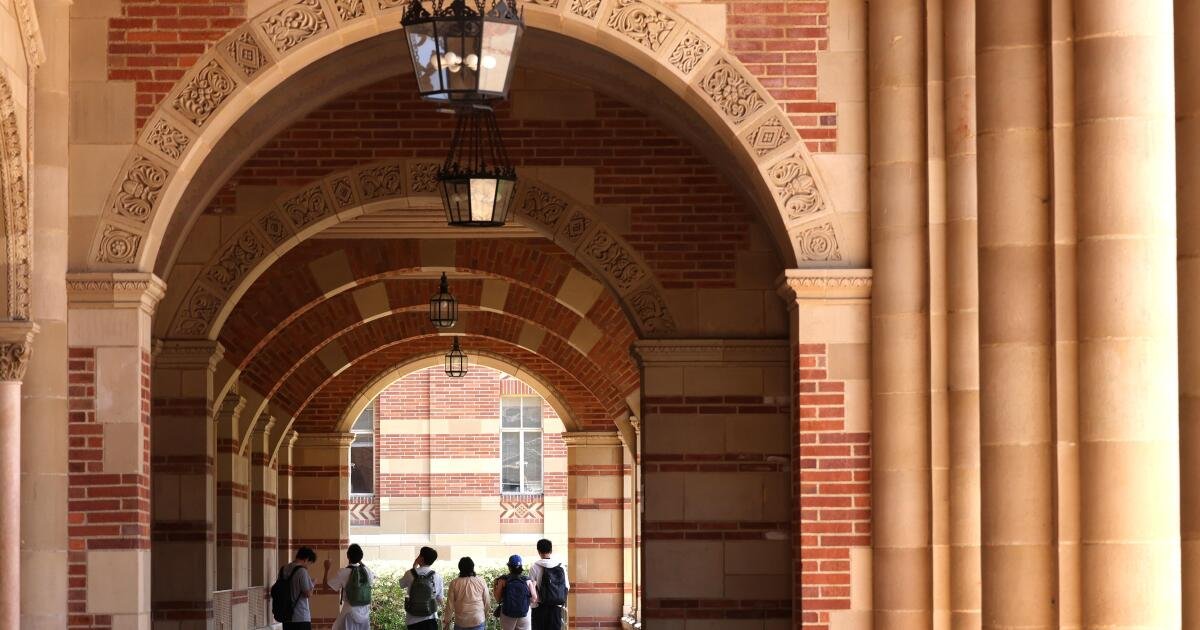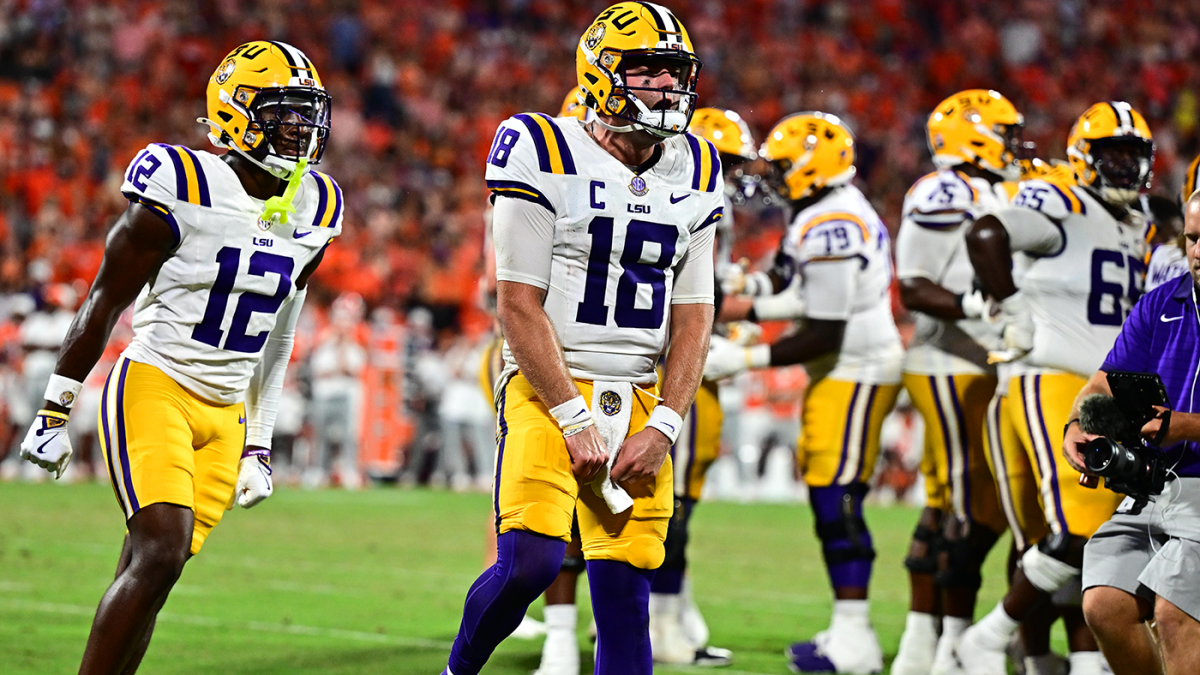Top Stories
Trump administration must restore hundreds of UCLA research grants, judge rules

A federal judge on Tuesday ordered the Trump administration to restore hundreds of suspended UCLA science research grants, affecting more than a third of awards totaling $584 million that the government abruptly froze late last month.
In her evening order, issued hours after a San Francisco court hearing, U.S. District Judge Rita F. Lin said the government’s slashing of UCLA funds violated her June ruling blocking science research grant terminations.
The National Science Foundation’s “suspension of the grants at issue here is vacated,” wrote Lin, of the Northern District of California.
She ordered the Trump administration to file an update by Aug. 19 detailing whether it had restored the grants and, if not, “an explanation of why it was not feasible and a description of the steps that have been taken thus far.”
The case — independently filed by a group of UC professors — is the first legal test of whether massive grant suspensions at UCLA will pass court muster.
The Trump administration has frozen more than half a billion dollars in science, medical and other federal grants, citing the university’s alleged discrimination in admissions and failure to “promote a research environment free of antisemitism.”
The UCLA suspensions cover research funded by the NSF, the National Institutes of Health and the Department of Energy. They include studies in areas such as cancer, neurobiology and clean energy.
In a statement Tuesday, a UC spokesperson said the restoration of funding would be “critical” to the university.
“While we have not had an opportunity to review the court’s order and were not party to the suit, restoration of National Science Foundation funds is critical to research the University of California performs on behalf of California and the nation,” said Stett Holbrook, associate director of strategic and critical communications.
An NSF spokesperson did not respond to a query from The Times.
Claudia Polsky, a UC Berkeley law professor representing researchers in the case, said in an interview that she hoped the results would aid UCLA in “resisting” the Trump administration’s cuts and its demand that the university pay $1 billion to restore grants.
“Hundreds of UCLA researchers can now get back into labs, into the field, and back on task,” said Polsky, who worked with UC Berkeley law school Dean Erwin Chemerinsky and San Francisco law firm Lieff Cabraser on the case. “Further: With hundreds of its suspended grants now ordered reinstated, UCLA should have considerably more leverage than it had this morning in resisting Trump administration demands that wrongly take research hostage for political dealmaking.”
Case predates major UCLA grant freezes in July
The order issued Tuesday is related only to NSF grants, which make up about 300 of those frozen at UCLA. Hundreds of other suspended grants from the NIH and Energy Department are not affected.
The court challenge did not come in a case filed by the University of California, which has not sued over the cuts. Instead, it came in a two-month-old class-action lawsuit filed by researchers at UC San Francisco and UC Berkeley.
At question during the Tuesday hearing was whether cuts to NSF grants were a violation of Lin’s June court order that blocked science funding terminations to many UC researchers throughout the nine-campus system.
UC professors funded by the NSF, Environmental Protection Agency and National Endowment for the Humanities had sued, arguing they faced cuts because their grants appeared in federal keyword searches related to race amid President Trump’s push to rid the government of diversity, equity and inclusion programs.
They also said their funding was removed through the use of generic form letters with no explanation. They argued federal law requires that government officials cite the reasons why money already approved through a competitive application process was taken away.
Lin said she was inclined to agree with researcher arguments while the case proceeded. She issued a preliminary injunction June 23.
What happened at Tuesday’s hearing
On Tuesday, Lin challenged Trump administration lawyers to explain why the new science cuts at UCLA did not violate her earlier court order.
“Two weeks ago, NSF went out and, again, used form letters to cut off funding to researchers at UCLA en masse,” Lin said. She asked Justice Department lawyers what set apart the most recent cuts from previous ones she enjoined.
Government lawyers replied that the funding freezes were “suspensions,” not “terminations,” which were the subject of Lin’s earlier ruling.
“If it is a suspension, then it is not covered under the court’s injunction,” said Justice Department lawyer Jason Altabet.
Another Justice Department lawyer, Michael Velchik, argued that the grants had been cut so recently that they could not be viewed as “terminations.”
“A week is certainly not enough time for this court to adjudicate that a suspension of one week is de facto a termination,” Velchik said.
In her order after the hearing, Lin disagreed.
“NSF’s indefinite suspensions differ from a termination in name only,” she wrote.
Lin later added: “For avoidance of doubt, the court also clarifies that grant ‘termination,’ as the term is used in the preliminary Injunction, encompasses circumstances where grant funding is cut off on a long-term or indefinite basis, like the suspensions carried out by NSF on July 30” at UCLA.
The government lawyers also said the Trump administration did not freeze all grants to UCLA but spared some that were “critical” and “important.”
They did not elaborate on which or how many grants those were. This answer came in response to Lin’s questions about whether the government was indiscriminately cutting grants — an issue that led her to block terminations earlier in the summer.
Chemerinsky, the UC Berkeley law dean, represented the researchers in oral arguments.
Chemerinsky said in court that the UCLA cuts amounted to “exactly the kind of en masse terminations that the court enjoined previously.”
For researchers, he said, the terms “suspension” and “termination” are the same.
“They can no longer pay rent, no longer pay graduate students, no longer pay postdocs. There is no difference,” Chemerinsky said.
The Berkeley professor accused the government of “holding hostage all the individual grants to try to coerce UCLA into a settlement.”
Velchik disagreed.
“There are legitimate and bona fide concerns that the government has with the conduct that has taken place at UCLA,” he said, saying the university has had “gross and horrific” antisemitism and also mentioning allegations of “racial preferences” at the UCLA medical school.
The Trump administration has demanded more than $1 billion from the University of California to restore the more than half a billion dollars in UCLA funds. The government is also asking UCLA to agree to sweeping campus changes related to protest rules, gender identity, admissions data sharing and other areas.
UC leaders say that they are willing to negotiate but that the current terms are “unacceptable.” Gov. Gavin Newsom has called the Trump demands an attempt at “extortion” and “ransom” and said he wants to sue.
The UC Board of Regents, which held an emergency meeting at UCLA on Monday, has not announced a suit.
Top Stories
Aid flotilla with Greta Thunberg set to sail for Gaza to ‘break illegal siege’ | Greta Thunberg

A flotilla carrying humanitarian aid and activists, including Swedish climate campaigner Greta Thunberg, is due to leave from Barcelona on Sunday to try to “break the illegal siege of Gaza”, organisers said.
The vessels will set off from the Spanish port city to “open a humanitarian corridor and end the ongoing genocide of the Palestinian people”, said the Global Sumud Flotilla.
They did not say how many ships would set sail or the exact time of departure.
The flotilla is expected to arrive at the war-ravaged coastal enclave in mid-September.
“This will be the largest solidarity mission in history, with more people and more boats than all previous attempts combined,” Brazilian activist Thiago Ávila told journalists in Barcelona last week.
Organisers say that dozens of other vessels are expected to leave Tunisian and other Mediterranean ports on 4 September.
Activists will also stage simultaneous demonstrations and other protests in 44 countries “in solidarity with the Palestinian people”, Thunberg, who is part of the flotilla’s steering committee, wrote on Instagram.
As well as Thunberg, the flotilla will include activists from several countries, European lawmakers and public figures such as former Barcelona mayor Ada Colau.
“We understand that this is a legal mission under international law,” leftwing Portuguese lawmaker Mariana Mortágua, who will join the mission, told journalists in Lisbon last week.
Israel has already blocked two attempts by activists to deliver aid by ship to Gaza, in June and July.
In June, 12 activists on board the sailboat Madleen were intercepted by Israeli forces 185km west of Gaza. Its passengers, who included Thunberg, were detained and eventually expelled.
In July, 21 activists from 10 countries were intercepted as they tried to approach Gaza in another vessel, the Handala.
Top Stories
No. 9 LSU outlasts No. 4 Clemson as Garrett Nussmeier outduels Cade Klubnik in top-10 showdown

No. 9 LSU went on the road and shocked No. 4 Clemson 17-10 to pick up a crucial road victory and firmly cement its place in the national championship picture. The battle went down to the final minutes, but LSU coach Brian Kelly finally picked up his first season-opening victory as Tigers coach.
Tied 10-10 at the start of the fourth quarter, LSU quarterback Garrett Nussmeier put together a legacy drive. After he was roughed on a completion to Aaron Anderson, Nussmeier ran for a third-down conversion and then found tight end Trey’Dez Green for an 8-yard touchdown to give LSU a lead it would never surrender.
Clemson had three more chances to get back into the end zone, turning it over on downs once and going three-and-out to set up a pivotal final drive. Clemson quarterback Cade Klubnik completed a big-time pass to T.J. Moore while taking a shot to lead a drive into the red zone. Facing fourth-and-4, LSU defender Harold Perkins brought pressure and forced an incompletion to end the game.
Playing against a phenomenal Clemson defense, Nussmeier stepped up big, completing 28 of 38 passes for 230 yards and a touchdown in the win. Anderson was his top target, catching six passes for 99 yards, including a 39-yarder. Running back Caden Durham went for 74 yards and a touchdown. Klubnik was strong, throwing for 230 yards, with four receivers hitting four catches. However, the lack of running game (20 carries for 31 yards) stood tall in the biggest moments.
Read on below for takeaways from LSU’s season-opening win over Clemson on Saturday.
Top Stories
Powerball jackpot jumps to an estimated $1.1 billion after no winning tickets in Saturday’s drawing

The Powerball jackpot has risen to an estimated $1.1 billion, the fifth-largest ever in the game’s history, after there were no winning tickets for Saturday night’s $1 billion grand prize.
Saturday’s winning numbers were 3, 18, 22, 27 and 33, with a Powerball of 17. There were nine tickets that matched all five white balls to win $1 million, but no ticket matched all six.
The $1.1 billion jackpot for Monday night’s drawing has an estimated cash value of $498.4 million.
Based on the jackpot estimate, a single jackpot winner Monday would have the choice of taking a lump sum payment of $498.4 million before taxes, or going with the annuity option, which would consist of one immediate payment followed by 29 annual payments that increase by 5% each year, each payment also before taxes.
Saturday’s drawing marked the sixth time in the game’s 33-year history that the top prize has climbed to the billion-dollar mark.
No one has won Powerball’s jackpot since May 31, when a single ticket in California won a $204.5 million jackpot with a cash value of $91.6 million.
Four of the five previous billion-plus-jackpot-winning tickets were sold in California, including a single ticket sold in Altadena in 2022 that claimed a $2.04 billion jackpot, the largest in both Powerball and lottery history.
The next drawing, which takes place from the Florida Lottery live draw studio in Tallahassee, is on Monday at 11 p.m. ET. Tickets are $2 and are sold in 45 states, the District of Columbia, Puerto Rico and the U.S. Virgin Islands.
contributed to this report.
-
Tools & Platforms3 weeks ago
Building Trust in Military AI Starts with Opening the Black Box – War on the Rocks
-

 Ethics & Policy1 month ago
Ethics & Policy1 month agoSDAIA Supports Saudi Arabia’s Leadership in Shaping Global AI Ethics, Policy, and Research – وكالة الأنباء السعودية
-

 Events & Conferences3 months ago
Events & Conferences3 months agoJourney to 1000 models: Scaling Instagram’s recommendation system
-

 Business2 days ago
Business2 days agoThe Guardian view on Trump and the Fed: independence is no substitute for accountability | Editorial
-

 Jobs & Careers2 months ago
Jobs & Careers2 months agoMumbai-based Perplexity Alternative Has 60k+ Users Without Funding
-

 Funding & Business2 months ago
Funding & Business2 months agoKayak and Expedia race to build AI travel agents that turn social posts into itineraries
-

 Education2 months ago
Education2 months agoVEX Robotics launches AI-powered classroom robotics system
-

 Podcasts & Talks2 months ago
Podcasts & Talks2 months agoHappy 4th of July! 🎆 Made with Veo 3 in Gemini
-

 Podcasts & Talks2 months ago
Podcasts & Talks2 months agoOpenAI 🤝 @teamganassi
-

 Jobs & Careers2 months ago
Jobs & Careers2 months agoAstrophel Aerospace Raises ₹6.84 Crore to Build Reusable Launch Vehicle

